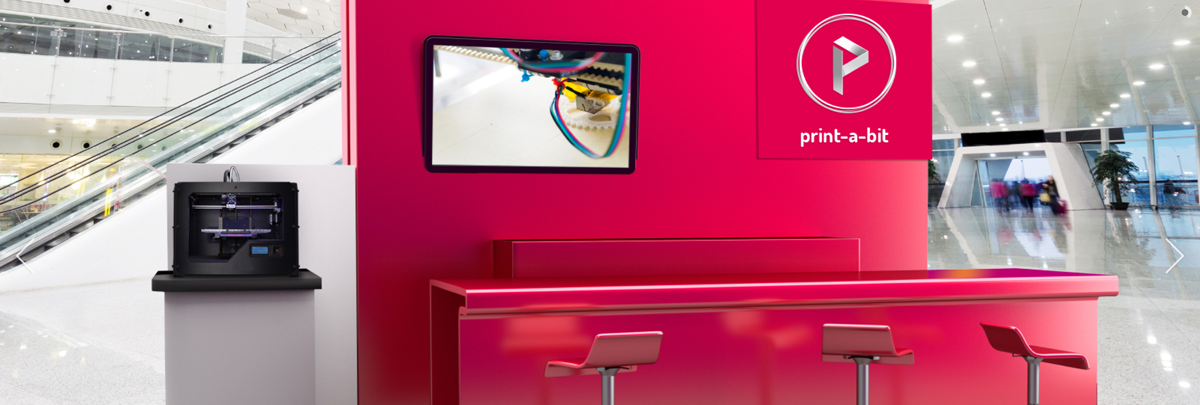Rachel forwarded some info regarding a new company to me and asked me to snoop around a little bit. The company: 6th Dimension Technologies, a subsidiary of another company called Changing Technologies, Inc., traded on the OTCBB as CHGT. Are you down with the OTCBB? Yeah, you know me; I’m not either. Both companies have slick websites, with 6th Dimension’s implying the existence of its flagship product, the Print-A-Bit kiosk. Rachel was worried that the Changing Technologies – or CHGT, as it likes to call itself – might wind up being something like Massive Dynamics, another publicly traded 3D printing company with a sort of vague back story that TCT prsnlz determined may be a scam. Is CHGT a scam? I don’t know if I have the authority to make those sorts of decisions, but I can tell you a bit about them.
6th Dimension is advertising a realistic product: a 3D printing kiosk, in which customers would walk up to a 3D printer, with accompanying computer interface, select and customize an item, and have it printed out. This product is so realistic that it’s been executed before by a start-up called PieceMaker, which has placed its 3D printing Factory-In-A-Store kiosk in toy stores with some success. Unlike PieceMaker, 6th Dimension’s product is still in the development stage, according to press releases. That doesn’t mean that it won’t exist, though.

What made Rachel a bit skeptical of CHGT, in addition to being traded on the OTCBB, was that their press releases list them as “in the cutting-edge technology sphere alongside companies including Voxeljet AG (NYSE:VJET), Arcam AB (OTCBB:AMAVF), and ExOne Co. (NASDAQ:XONE).” While they may be in the same technology sphere, in that they are pursuing a 3D printing business, they aren’t really alongside those more established companies. Not even PieceMaker would describe themselves in that way and they already have a product being tested in the real world, so it’s surprising to see a company with SEC filings that state “at March 31, 2014 we had working capital of $11,340, consisting of cash on hand of $11,940” to do so. If that’s all the money necessary to be considered in the sphere of voxeljet, Arcam, and ExOne, I, and other owners of desktop 3D printers, can probably say that we’re right alongside them, too.
With the 3D printing boom continuing, we’re likely to see even more companies like CHGT try to take advantage of meek investors hoping to scrape up some money during bleak economic times, à la Glengarry Glen Ross. These sorts of businesses might anger some people, but, it’s hard to blame them – the businesses or the people – because we’re all pretty desperate to have a little bit of money these days.
As living organisms, we need certain things to literally survive: food, water, shelter. As social animals, we need companionship and/or social support, too. In our current society, the way that those basic necessities can be acquired is with money, which also buys comfort and safety. As a result, basic necessities and money have become conflated with money somehow representing survival and more money representing greater survival, despite the fact that there are countless songs, proverbs, and children’s movies telling us otherwise. So, despite the fact that most people seem to be aware that it is nothing but paper, plastic and ones-and-zeroes, we’ve come to think money is the end goal, instead of survival and happiness.
In actuality – at least according to a Princeton study by Daniel Kahneman – happiness can be bought with an average household income of $75,000 and, after that, emotional satisfaction doesn’t improve all that much. Once a household has purchased all of the goods necessary for survival, plus added comfort and financial security, relative emotional well-being sort of plateaus, though perception of well-being may not. Whether or not the study is entirely accurate, I believe that it verifies most people’s subconscious intuitions about happiness and money. Of course, that’s just a subjective opinion, but I believe that if you watch enough Disney movies, listen to the Beatles, and read some fortune cookies, you might agree.
The long-term solution to limiting these potential scam companies may be, then, to somehow change the structure of our society so that it is geared towards seeking happiness instead of money. There are countless proposals towards creating such a society and I don’t think that any individual can project the way an entire system should be structured. Instead, it’s something that we’d all need to decide for all of us all of the time resembling, in some ways, a true democracy. Before I ramble for too long, I’ll close by saying that, in such a society where happiness was the goal and not financial gain, the founders of a company like CHTG might have their basic needs met – food, water, shelter – and they can spend their time doing something else that more suits their skills instead of trying to jump into an already hyper-competitive market to scrape up a few bucks.

Leave A Comment